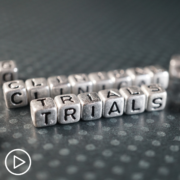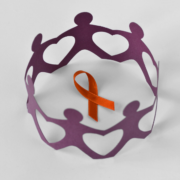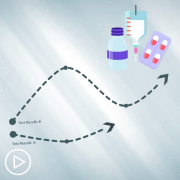Why Is Post-Access Enrollment Vital in AML Clinical Trial Participation?
Why Is Post-Access Enrollment Vital in AML Clinical Trial Participation? from Patient Empowerment Network on Vimeo.
For acute myeloid leukemia (AML) clinical trial participation, what makes post-access enrollment essential? Expert Dr. Andrew Hantel from Dana-Farber Cancer Institute and Harvard Medical School discusses factors that play into post-access enrollment and patient advice to help decide about clinical trial participation.
[ACT]IVATION TIP
“…when you’re asking about clinical trials, really ask not only what the trial is about, which is very important in deciding if whether or not it’s appropriate for you, but ask everything about the logistics and ask everything about what it would mean for you as a patient…by looking at it as, who am I as a person, and does this fit with me and sit with also how I want to give back to other people who have leukemia. That’s kind of one way that we help people think about whether or not they want to participate.”
Download Resource Guide | Descargar guía de recursos
Related Resources:
Transcript:
Lisa Hatfield:
Dr. Hantel, what does post-access enrollment mean, and why is it important in understanding disparities in AML clinical trial participation?
Dr. Andrew Hantel:
Sure, so we have a lot of steps between somebody getting diagnosed with AML and somebody enrolling on a clinical trial, and the first step is actually being at a site where clinical trials are offered. And in a lot of cancers, that is kind of the major barrier to getting on trials and that a lot of people are taken care of at clinics or in hospitals where there just aren’t clinical trials available for their cancer at all. And so after that, we kind of have this idea of a lot of other steps that are needed, even when the person is at a site with clinical trials.
And that’s kind of that whole idea of what post-access enrollment refers to, that in a very granular way, means and at a site that has clinical trials, does that site now have clinical trials that are right for my specific type of AML, and then after that, am I actually eligible for that particular trial, and after that, do I want to participate, and after that, is it feasible for me to participate?
Because there are a number of other factors that come into a clinical trial, like maybe extra visits, maybe extra tests, a lot of other things that come into trial participation beyond just what the actual trial is studying, and so all of those things together mean post-access enrollment, and there are concerns for acute leukemia with respect to post-access enrollment, because it seems like those kind of bevy of steps are where patients who are historically underserved and from minoritized backgrounds are being excluded more from clinical trials or at least not allowed to participate as much, and we don’t know yet if there is one particular step, but it seems like from all the evidence that we have, that it’s kind of a combination of slightly more difficult steps at each point in that process that make it so in the end, those groups are less likely to enroll and less likely to participate.
In the past, there was a lot of, I would say almost blame put on some of those groups because it was thought that they were more distrustful of the medical establishment, and I think for right reasons, at least in the past, the medical establishment has done horrible things to minoritized groups in this country. But we’ve recognized that it’s more a lot of structurally racist barriers that are put up in front of those people, and that the good evidence now is that people, no matter their background, really want to participate in clinical trials to the same degree.
And that it’s more kind of the structure is that we, the walls that we put up in front of them, or other things that are stopping them from enrolling, could be insurance, it could be access, it could be eligibility criteria, it could be kind of all of those other burdens that are required, like having a caregiver and everything else, but together, everything after access seems to be just as important for getting people onto a clinical trials in AML, whereas that’s not as much the case in some other diseases.
Lisa Hatfield:
Okay, thank you. And do you have an activation tip for that question, Dr. Hantel?
Dr. Andrew Hantel:
My activation tip for this question would be, when you’re asking about clinical trials, really ask not only what the trial is about, which is very important in deciding if whether or not it’s appropriate for you, but ask everything about the logistics and ask everything about what it would mean for you as a patient. There are some trials that are doing wonderfully about this and really trying to make sure that people are able to continue to live their lives while enrolling and participating in clinical trials.
And so I think by looking at it as, who am I as a person, and does this fit with me and fit with also how I want to give back to other people who have leukemia. That’s kind of one way that we help people think about whether or not they want to participate.
Lisa Hatfield:
Okay, thank you. And everything you talked about, it sounds like clinical trials are so complicated. If patients can have an advocate with them most of the time when they’re going to these appointments, it might be super helpful too, to take somebody with you. There’s a lot of information being throughout it patients, especially when it comes to clinical trial information, so thank you.
Dr. Andrew Hantel:
I completely agree.













